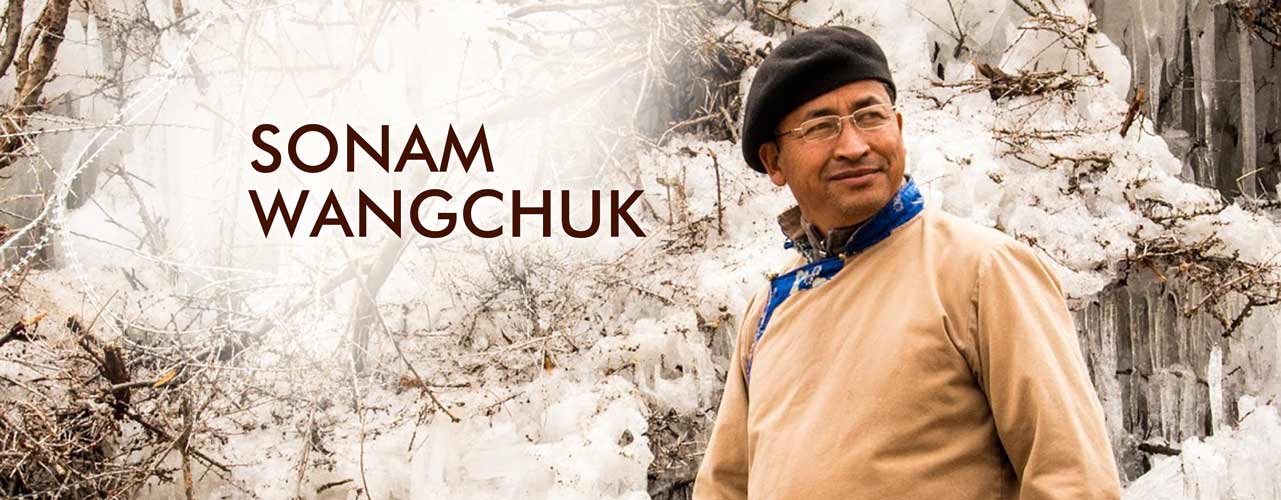Sonam Wangchuk is a renowned innovator, engineer, and education reformist from Ladakh, India. He gained widespread recognition for his innovative work in sustainable development, particularly in the fields of education and environmental conservation. Wangchuk’s initiatives have not only transformed the lives of people in the remote regions of Ladakh but have also inspired global efforts towards sustainable development and alternative education models.
Early Life and Education
Sonam Wangchuk was born in 1966 in Uleytokpo, a small village in the Leh district of Ladakh, India. Growing up in the serene yet harsh environment of the Himalayas, he developed a deep connection with nature and a strong sense of community responsibility from a young age. After completing his schooling in his hometown, Wangchuk pursued a degree in Mechanical Engineering from the National Institute of Technology (NIT) in Srinagar, Jammu and Kashmir.
Ice Stupas: Innovation for Water Conservation
One of Wangchuk’s most notable innovations is the concept of “Ice Stupas,” which he developed to address the water scarcity issues faced by Ladakh during the arid summer months. In mountainous regions like Ladakh, water scarcity is a significant challenge due to limited rainfall and reliance on glacial meltwater for irrigation and domestic use.
The Ice Stupa project aims to create artificial glaciers that store winter water runoff in the form of conical ice mounds. These ice stupas melt gradually during spring and summer, providing water for agriculture precisely when it is needed the most. The conical shape of the ice stupas minimizes surface area exposed to the sun, reducing melting rates and prolonging water availability.
Wangchuk’s innovative approach not only addresses water scarcity but also harnesses local resources and traditional knowledge. The project involves local communities in its construction and maintenance, fostering a sense of ownership and sustainable practices among the people.
The success of the Ice Stupa project has garnered international attention and has been replicated in other water-stressed regions worldwide. Wangchuk’s work highlights the importance of indigenous wisdom and community-driven solutions in tackling complex environmental challenges.
Alternative Education: SECMOL and Himalayan Institute of Alternatives
In addition to his environmental initiatives, Sonam Wangchuk is a strong advocate for reforming the traditional education system, especially in remote and rural areas. He believes in nurturing creativity, practical skills, and critical thinking among students, rather than relying solely on rote learning and academic achievements.
Wangchuk co-founded the Students’ Educational and Cultural Movement of Ladakh (SECMOL) in 1988, aiming to improve the quality of education and empower youth in Ladakh. SECMOL emphasizes a student-centered approach, interactive learning methods, and a curriculum that integrates traditional knowledge with modern subjects.
One of SECMOL’s notable achievements is the establishment of the SECMOL Alternative School, which provides an alternative learning environment for students who struggle in traditional schools. The school focuses on hands-on learning, vocational skills training, and sustainable living practices. Students actively participate in running the school, including managing daily operations and contributing to community projects.
Building on the success of SECMOL, Wangchuk founded the Himalayan Institute of Alternatives (HIAL) in 2018. HIAL aims to revolutionize higher education by offering courses that blend academic knowledge with real-world application, entrepreneurship, and sustainable development principles. The institute promotes innovation, critical thinking, and social responsibility among its students, preparing them to tackle complex global challenges.
Awards and Recognition
Sonam Wangchuk’s pioneering work in sustainable development, education reform, and environmental conservation has earned him numerous awards and accolades. Some of his notable achievements include:
- Rolex Awards for Enterprise (2016): Wangchuk was awarded the Rolex Award for Enterprise for his innovative Ice Stupa project, which addresses water scarcity in the Himalayan region.
- Ramon Magsaysay Award (2018): He received the Ramon Magsaysay Award, often regarded as Asia’s Nobel Prize, for his contributions to education reform and sustainable development in Ladakh.
- Ashoka Fellowship: Wangchuk is an Ashoka Fellow, recognizing his role as a social entrepreneur and changemaker in creating positive impact and inspiring change in society.
- Padma Shri: In 2020, he was honored with the Padma Shri, one of India’s highest civilian awards, for his exceptional contributions to sustainable development and education.
Legacy and Impact
Sonam Wangchuk’s legacy extends far beyond his native Ladakh, inspiring individuals, communities, and governments globally to embrace innovation, sustainability, and inclusive education. His holistic approach to addressing societal challenges reflects a deep understanding of environmental, cultural, and socioeconomic dynamics.
Through projects like the Ice Stupa and institutions like SECMOL and HIAL, Wangchuk continues to empower local communities, equip youth with relevant skills, and advocate for environmentally conscious practices. His work serves as a beacon of hope and possibility, demonstrating that sustainable development is achievable through creativity, collaboration, and a deep respect for nature and humanity.
In conclusion, Sonam Wangchuk’s journey from a remote Himalayan village to an internationally recognized innovator and educator exemplifies the power of visionary thinking, community engagement, and perseverance in creating positive change. His work reminds us of the interconnectedness of environmental stewardship, education, and sustainable development in building a more equitable and resilient world for future generations.





